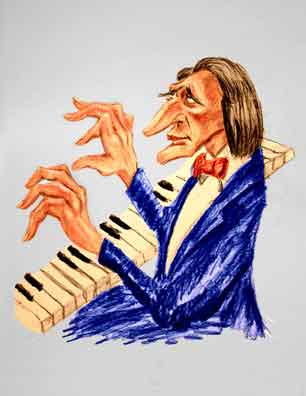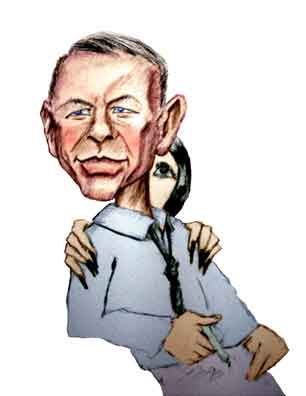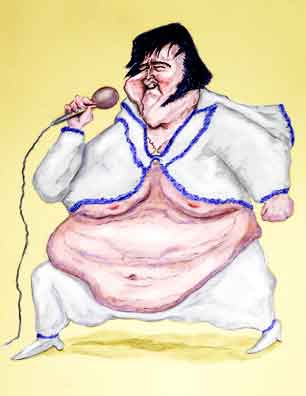Franz Liszt

Franz Liszt
Franz has left the building.
It was the poet Heinrich Heine who coined a word for the way the young ladies went nuts when Franz Liszt played the piano. He called it (in German) "Lisztomanie" (pronounced "Leest-oh-MAHN-ee-uh"). Of course, English speakers render this as "Lisztomania". Despite what you may read on the Fount of All Knowledge (the Internet), Heinrich did not think this was an actual disease. He believed it was a social phenomenon, a phenomenon that does indeed fit well with the "Beatlemania" from a century later.
Listomania was in someways a deliberate creation by Franz himself. For his concerts he deliberately picked showpieces intended to wow the audience. Sometimes he would transcribe some of the more flamboyant orchestral compositions - such as the "William Tell Overture" - for the piano. But he also wrote his own songs intended to impress.
As far as the record goes, Franz was the first performer where the young ladies wanted to rip away pieces of his clothes for souvenirs. They would even pick up his discarded cigar butts and stick them down their bodices. But rabid adulation of performers was not by any means new. People had always gone crazy upon hearing phenomenal virtuosity. Before Liszt the German singer Henriette Sonntag wowed audiences to frenzies (she was a soloist in the first performance of Beethoven's 9th Symphony). Before Henriette, the great castrato Farinelli, by singing over 1000 notes a minute and holding tones for (reputedly) six minutes, would make women faint. And before the Beatlemania of the 1960's, there was Bing Crosby, Frank Sinatra, and of course, Elvis.
Even now audiences hearing a Liszt composition played by a virtuoso may erupt into thunderous applause. But the songs don't have the same effect today as when they were premiered. After all, the songs, have become what is called "hackneyed" - that is, overexposed through repeated playing. By the time the mid-20th century rolled around, most people were being introduced to Franz by hearing Bugs Bunny play the "Hungarian Rhapsody #2". And because kids would sometimes watch the same cartoons over and over (and over and over), by the time they actually sat down to hear a Liszt concert, rather than throw flowers on the stage, they would as likely break out into disrespectful guffaws. But we shouldn't fault the kids for that. Even now, there is still the debate on just how good Franz's music really is.

Before Franz there was ...
Franz was born October 22, 1811 and had always shown talent when he was a kid. His dad, Adam, was also a musician and gave his son both encouragement and instruction. After all, this was the era when being a competent musician could land you a steady job. Music had to be live music or not at all.
Franz also studied with the then famous and successful pianist and composer, Carl Czerny, who himself had been a student of Ludwig van Beethoven. Carl, like Franz, had been also been a child prodigy, and although known well enough to music buffs, has never had the honor of having his music used in Warner Brothers cartoons.
The story was that Carl introduced Franz to Ludwig although Ludwig was reluctant to meet the kid, largely, said Franz, because Ludwig couldn't abide infant prodigies. Of course at that time - 1822 - Beethoven was already plagued by periods of deafness or at least "weakened hearing" and probably didn't really want to - or couldn't - listen to anyone.

... Elvis.
What really helped Franz in his career - in addition to his talent - was that his family lived across the street from a piano manufacturer who had invented a new piano where the hammer action allowed the playing to be more rapid. So the manufacturer sponsored concert tours with the young boy. Like Mozart before him, Franz became something of an oddity - a kid who could barely reach the pedals playing better than most adult professionals.
Unfortunately, when Franz was 16 his dad died, and Franz was on his own. He moved to Paris and became a piano teacher for rich kids. There he met a lot of famous Parisians - or at least people who lived in Paris - including Frederic Chopin.
Franz liked Paris and began living it up and making whoopee. Among those with whom he practiced whoopeeness was Marie Catherine Sophie. Marie Catherine was the Countess of Agoult wherever the heck that is. She was also nearly six years Franz's senior. Not much of a problem, though, if you're 24.
In the days when there was no way to avoid, well, shall we say, preuve de liaison if you made enough whoopee, Marie and Franz found out they were going to have what in other circumstances would be described as a happy event. But since Marie was still married to the Count d'Agoult, she and Franz decided it was best to hightail it to Switzerland. Their whoopeeness continued, and there were a number of other "events". Eventually Franz and Marie had three bundles of joy, Blandine, Cosima, and Daniel, who after a few years were shipped off to live with Grandmother Liszt. The kids didn't see their parents very often, although they did keep in touch by correspondence.
Franz finally got dragged into the real rock world when the movie Listomania was released in 1975. Of course anyone who sees this now incredibly dated movie knows - or should know - that any resemblance with the Franz created by Ken Russell and the Franz created by Mama and Papa Liszt is largely illusionary. If there's a lesson to be taken from the movie, it's just the well-recognized principle that when you read - quote - "history" - unquote - you are really learning more about the time of the historian than of the subject of the history.
Despite what you read on the Fount of All Knowledge (and in some books), there is no evidence that Franz was anti-Semitic. Yes, there are passages in his book that seem so, but they were added in a later edition by one of his girlfriends. Also there's the time he went into spittle-flinging diatribes where he wrote that the Jews hated his music for no particular reason. But the latter writing is taken from a longer passage where he was venting his spleen when he said everyone - that is, all religious and ethnic groups - hated his music. And it wasn't true in any case. Now people may have gotten tired of hearing his songs, but that doesn't mean they hated them. For his part, Franz flatly stated he was not anti-Semitic and that he respected all decent people.
Like many people who lived a wild life, as Franz got older he became more conservative. In the early 1840's, he gave up the life of a free-lance touring musician and became kapellmeister - that is the musical director - at Weimar. But even that job got too hectic for him, and eventually he moved into a Catholic monastery and actually took religious orders. He would still give concerts, but dressed in his clerical robes, and he was billed as Abbé Liszt.
As a young man in Paris, Franz had met the composer and his contemporary, Richard Wagner. Franz himself not too pleased when in later years his daughter Cosima and Richard began showing interest in each other. After all, both Richard and Cosima were then married to someone else. But given Franz's old modus vivendi, he was really in no position to criticize. But - unusual for the time - Richard and Cosima managed to dissolve their marriages and then got hitched and produced three kids. Their only son, Siegfried, would become a conductor and a composer of more operas than his dad, but few of which are performed today.
Richard died in 1883 and by that time the Wagner festival at Bayreuth were established as a major cultural fest of the highest order. By then Franz and Cosima would visit with each other, and in 1886, Franz had gone to Bayreuth. But he came down with pneumonia, even today a fairly serious disease, and he died on July 31. Franz had finally left the building.
References
Franz Liszt: The Man and the Musician, Ronald Taylor, Universe Books, 1986
"Still Wondering If Liszt Was Any Good", Kenneth Hamilton, New York Times, October 21, 2011
Liszt in the World, Betty McManus Cecil Lytle, Presented by Cecil Lytle, University of California Television, Finally, an informative documentary about Franz.